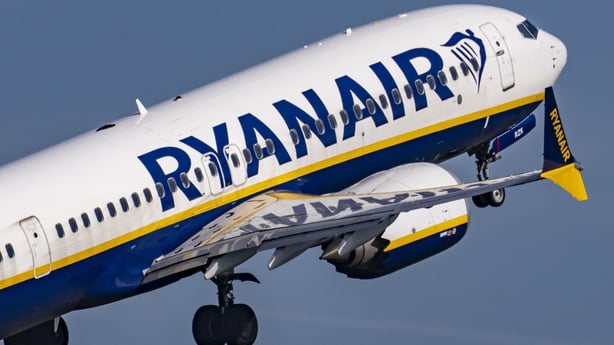Ryanair has today upgraded its summer air fare outlook, with group CEO Michael O'Leary telling Reuters he no longer saw a risk of double-digit percentage falls as European short-haul weakness had "levelled out".
Ryanair's shares ended over 4% higher in Dublin trade.
The airline's shares fell 15% last month when Michael O'Leary warned of a downward trend in fares that could exceed 10% in its key July-September quarter, heightening fears of a weak summer for European airlines as a post-Covid boom peters out.
Mr O'Leary said today that a fall of 5% during that period, which he described in July as the best-case scenario, now "looks reasonably accurate".
The risk of what Mr O'Leary described at the time as an "ugly scenario" of double-digit falls in average fares "looks like it has disappeared," he said in an interview in Brussels.
"While fares were kind of softening during April, May and June, that has levelled out," he added.
Ryanair makes significant profit from high last-minute fares, but in July Mr O'Leary said consumers were refusing to buy late high-price tickets, and only buying when the price was cut.
Asked if Ryanair was still seeing the same issue, Mr O'Leary said current price resistance was "not the same".
Ryanair group chief executive Michael O'Leary also said today that Boeing's new management "continue to disappoint" and that deliveries were behind schedule.
The airline, one of Boeing's largest customers, said there was a risk it would take delivery of just 20-25 of the 737 MAX aircraft ahead of next summer, rather than the 29 scheduled.
"Things are continuing to slip slightly, it's been disappointing," Michael O'Leary told Reuters in an interview.
"We're working closely with Stephanie Pope and the new team in Boeing, but they continue to disappoint us," he said, referring to the head of Boeing Commercial Airplanes, who was appointed in March.
Boeing last month named aerospace industry veteran Kelly Ortberg as its chief executive.
Boeing has pledged to grow output by the end of the year, after wrestling with supply chain snags and operating a slower assembly line since a January 5 in-flight blowout of a door plug on a 737 MAX 9 jet that heightened regulatory scrutiny.
Michael O'Leary said Ryanair had received five aircraft in July instead of the seven scheduled and that it looked like it would get just five of 10 scheduled for August.
"Boeing have had significant production problems. We think they're getting to the end of that," he said.
Ryanair said in July that Boeing had warned it some 737 MAX deliveries due by next spring would be delayed until the peak summer months of 2025 – a repeat of delays this year that forced a cut in its summer traffic volumes.
Ryanair, Europe's largest by passenger numbers, already has 150 firm orders for the MAX 10, the largest jet in the 737 family, and options for 150 more, with the first deliveries due in 2027.
Mr O'Leary said the smaller MAX 7 was supposed to be certified by the end of this year, but that looks like slipping into the first half of 2025.
He said it was "impossible to know" if certification of the MAX 10 would be on time in the first half of 2025.
"It's a day-by-day challenge with Boeing," he stated.
But Ryanair's Eddie Wilson voiced his confidence that Boeing will overcome its production issues, in comments to Reuters today.

"It will just take time for them to sort out these production issues," said Wilson, the chief executive of the group's largest airline, Ryanair DAC.
"But we are reasonably confident in the medium to long term that this is absolutely fixed," he added.
In the short term, there is some frustration over delayed aircraft deliveries, the executive added.
Meanwhile, Ryanair said today it will cut 20% of its traffic at Berlin-Brandenburg airport, which will result in a loss of 750,000 seats, after the German government and airport did not address high access costs.
The cuts will see Ryanair's Berlin-based aircraft reduced to seven from nine and six routes trimmed, the airline said.
The airline has repeatedly warned that it would reduce its presence in Berlin and switch capacity to other EU countries if Germany did not meet its demands, including reversing an aviation tax increase and reducing air traffic control charges.

